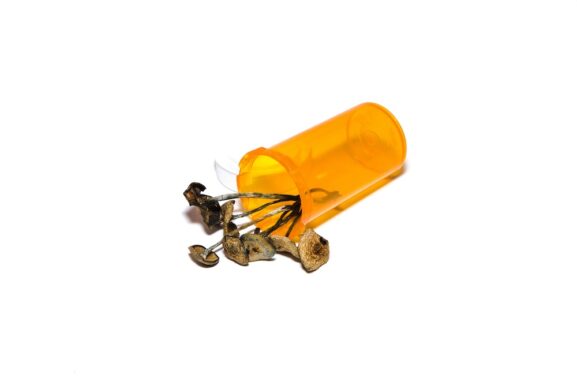These are the 7 Stages of a DMT Trip: From The Pre-Trip To Long-Term Effects
DMT (N,N-Dimethyltryptamine) is a potent, fast-acting, and short-lasting psychedelic. It belongs to the tryptamine family of psychedelics, along with psilocybin (the active ingredient in magic mushrooms) and ibogaine. The chemical similarity of DMT to psilocybin can sometimes mean the two experiences share some similarities. Indeed, many people claim a high-dose psilocybin mushroom trip is much like a DMT trip.
However, DMT is different from psilocybin in several ways, including — for many people — the nature of the experience itself. DMT is also distinct from many other longer-lasting psychedelics, like LSD and mescaline, as well as similarly short-lasting compounds like salvia.
To ensure that you have a broad understanding of what a DMT trip is like, we have compiled this guide on what might occur during the different stages of the experience.
- Pre-trip
- Onset
- Come up
- Peak
- Offset (or coming down)
- After effects
We also include what to expect after an experience, including short-term and long-term effects. Finally, we take a look at the possible side effects so that you will be prepared for those and understand them as a normal part of a DMT trip.
RELATED: What Is 5-MeO-DMT – The World’s Most Powerful Psychoactive Substance
The 7 Stages Of A DMT Trip
1. Preparing For A DMT Trip
When you are preparing for a DMT experience — whether mentally preparing yourself on the day you plan to do it, or just moments before — it is normal to experience some anxiety and nervousness. Users refer to this as the “pre-flight jitters”. Knowing that DMT comes on quickly and can potentially lead to an ego-shattering experience will make even the most experienced users feel a bit anxious before the trip.
It can be helpful during this stage to practice mindfulness, by focusing intently on your breathing, as well as breathing deeply.
2. The Onset
This is the period until the very first changes in subjective experience are detectable. DMT has a rapid onset, occurring within 20 seconds after smoking or vaporizing the compound. The first noticeable changes that occur during the onset may include the following.
- Colors enhanced in your surroundings
- Objects appearing more vivid
- Seeing the appearance of geometric patterns around you
- Hearing a high-pitched whining or whirring sound
- Pre-trip anxiety melting away
3. The Come Up
The come up phase of a DMT trip can be defined as the period between the first noticeable subjective or perceptual changes and the point of greatest intensity. This stage occurs after 20 seconds to two minutes. When you are coming up on DMT, you will likely experience the below.
- A gradual loss of bodily awareness
- The high-pitched sound increasing in intensity
- Objects in the environment morphing
- Seeing more intricate and clearly defined geometric patterns
- Perceptual changes occurring more quickly
- A desire to close your eyes and immerse yourself in the experience as the peak approaches
- With eyes closed, you can see complex geometric patterns changing at an incredible speed
- After closing your eyes, you may have a sense of movement, like moving through a tunnel or moving upwards
- You may have the sense of breaking into an alternate reality
4. The Peak
The peak phase of the DMT trip is when the intensity of the compound’s effects reaches its height. This stage occurs 2-5 minutes into the trip. The peak is when the most notable features of the DMT experience occur. This is also the stage that can be the most difficult to remember. DMT’s peak effects tend to have some key aspects.
Traveling Through Hyperspace
You can have the feeling of traveling through an alternate reality, which users describe as “hyperspace”. This different realm may take on the appearance of a circus, carnival, casino, room, temple, cathedral, mosque, futuristic or hi-tech environment, or alien world.
Hyperspace is a place astonishingly complex and extraordinary. Many users say it is ineffable, meaning that it is impossible to adequately describe it in words. Language simply cannot do it justice.
Some features of hyperspace may include distinctive geometric patterns and alien writing on surfaces, as well as unusual objects. You might also have the sense of traveling through this realm at an incredible speed or the realm itself changing rapidly.
Meeting Strange Entities
You may come into contact with strange entities. These entities may look like alien creatures, insects, elves, jesters, clowns, or circus entertainers. There may be a single entity or many of them. They are known for being zany, friendly, loving, and inviting. They might have the intention of welcoming you to their world and wanting to show you around.
However, during a more challenging experience, these entities may appear hostile, both physically and in their demeanor and attitude toward your entry into the DMT realm.
The entities, like hyperspace, are known to transform rapidly, as well as quickly come in and out of view. They might make odd gestures and want to interact or communicate with you.
Mystical Effects
Just as with other psychedelics, the peak is when you will tend to experience mystical subjective effects. These may include the following.
- Out-of-body experiences. The feeling that your consciousness is separate from your body and existing in a different dimension
- Ego death. Where you lose the sense of personal identity; you can have awareness of what you’re experiencing without feeling there is a “you” that is experiencing it
- A feeling of oneness or interconnectedness. This often accompanies ego loss; there is a sense of being everything, such as the totality of the experience or even the entire universe
- The feeling of timelessness (a state of eternal existence)
- The feeling of spacelessness (the feeling of existing in a place that is infinite, sometimes described as “the void”)
- A sense of the sacred, divine, or holy; or the feeling of meeting “God”
- Paradoxical experiences (e.g. the feeling of being everything and nothing at the same time)
- Ineffability
- The sense of gaining access to important truths about the nature of reality
RELATED: DMT Elves: What Are They, And Why Do People See Them?
5. Coming Down
The offset (or coming downs stage) of the DMT experience is the amount of time in between the end of the peak and the return to your sober state. You can return to normal reality as quickly as you entered the DMT realm. During this phase, it is common to experience the below.
- The feeling of regaining the sense of your body
- The return of your sense of self
- Regaining your sense of the outside world
- A slowing down and fading away of the visual aspect of the DMT trip
- Having the desire to open your eyes
- Seeing the outside world distorted when you open your eyes
- Strong feelings of awe, astonishment, and bewilderment about what you just experienced
- Difficulty remembering what you experienced
6. After Effects
The after effects are the residual effects that may remain after the DMT trip is over. This is typically described as an “afterglow”, which may involve feelings like:
- Positive mood
- Peacefulness
- Contentment
- Gratitude
7. Long-Term Effects
It is hard to say what the long-term effects of a DMT trip will be. Nonetheless, many users do find that even a single experience can lead to lasting changes, including alterations to their attitudes, beliefs, outlook on life, and mental health.
For example, a survey found that over half of respondents who previously identified as an atheist and who encountered an entity during a DMT trip no longer identified as an atheist after it. These respondents reported believing in “God”, a “higher power”, or “ultimate reality” after their experience.
Often, these changes are felt to be beneficial. People may report experiencing more positive emotions in day-to-day life, having a renewed appreciation for life, and the loss of the fear of death.
As with any psychedelic experience, however, a particularly distressing experience may have lingering negative effects. This may include what is known as a spiritual emergency: a crisis state that occurs after a spiritual experience. If this occurs, it’s important to take a break from psychedelics and take time to integrate your DMT trip. Often, a so-called “bad trip” can prove to be positive in the long term.
But this can involve time, personal reflection, and perhaps emotional support, such as from others who have been through a similar experience and/or a trained therapist.
RELATED: What Is 4-ACO-DMT, And Is It Legal?




Kass Durkee
July 18, 2022 at 2:16 pmWell written, comprehensive
Easy to access
Thnx